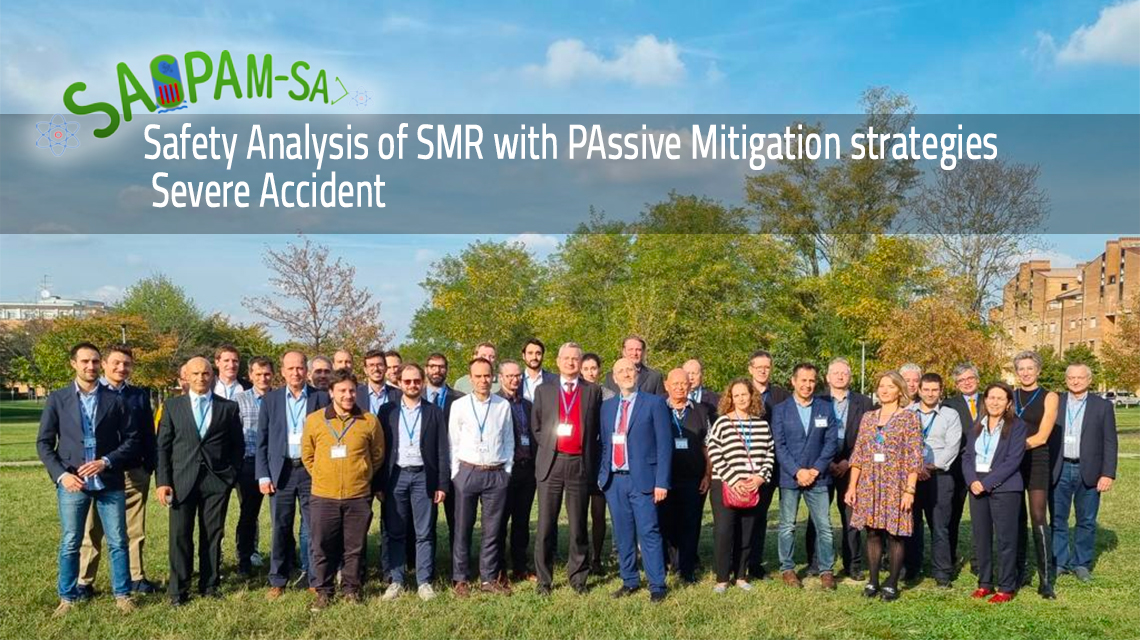Italian National Agency for New Technologies, Energy and Sustainable Economic Development

Energy: Nuclear safety, at the start SASPAM-SA international Workshop on Small Modular Reactor
At the start the International Workshop on SMR Safety for a Sustainable Short-term Deployment, organized by SASPAM-SA Horizon Euratom Project, taking place in France from October 17th to 18th 2024 and aimed at promoting international exchange of information and best practices related to light water Small Modular Reactor (SMR) safety, considering the outcomes from the current ongoing projects, other EU and international initiatives (IRSN Headquarters, 31 av. De la Division Leclerc, Fontenay-aux-Roses, France).
Coordinated by ENEA and funded under Horizon Euratom with over 4 million euros, the SASPAM-SA project (Safety Analysis of SMR with Passive Mitigation strategies – Severe Accident) aims to analyze and review the knowledge and know-how related to the operation of large nuclear reactors cooled by light water (LWR) to be used as a background to support the licensing and deployment of SMRs.
The event aims to share the advancements of the current major research activities on Light Water SMR (LW-SMR) safety and give the opportunity to discuss the main results and promote international coordination between organizations on the topic. This allows to identify the needed knowledge development, in the view of additional short-term research actions, to support the SMR European licensing process.
The event will also be the occasion to provide answers to the many open questions in research on new nuclear and to provide an overview of the progress, bring together the projects and the main activities on the safety of water SMRs.
SMRs have attracted growing interest in various countries thanks to their advanced design features, such as, for example, greater intrinsic safety, simplified plant construction, shorter construction times and reduced economic-financial risk. In particular, LW-SMRs are part of the so-called evolutionary reactors and as such are based on the technology of larger Light Water Reactors (LWRs) but with modifications aimed at increasing their intrinsic safety. Considering this element of continuity, these reactors benefit from all the research activity developed in recent decades and all the operational experience deriving from the operation of LWRs, but they have higher intrinsic safety. The main features of SMRs are, for example, the reduction of unit power, the increase of safety margins and the replacement of active safety systems with passive safety systems. This significantly reduces the probability of serious accidents, thus meeting the demands of the international community and citizens. In this way, the consequences of a hypothetical accident are also significantly reduced.
23 partners from 13 countries are participating in the project: ENEA, Italy; CIEMAT, Spain; CNRS, France; EDF, France; FZJ, Germany; GRS, Germany; INRNE, Bulgaria; IRSN, France; KIT, Germany; KTH, Sweden; LEI, Lithuania; POLIMI, Italy; RATEN, Romania; RUB, Germany; SINTEC SRL, Italy; SSTC-NRS, Ukraine; SURO, Czech Republic; TRACTEBEL, Belgium; TUS, Bulgaria; UNIROMA1, Italy; VTT, Finland; JRC- Joint Research Center – European Commission; PSI, Switzerland)
